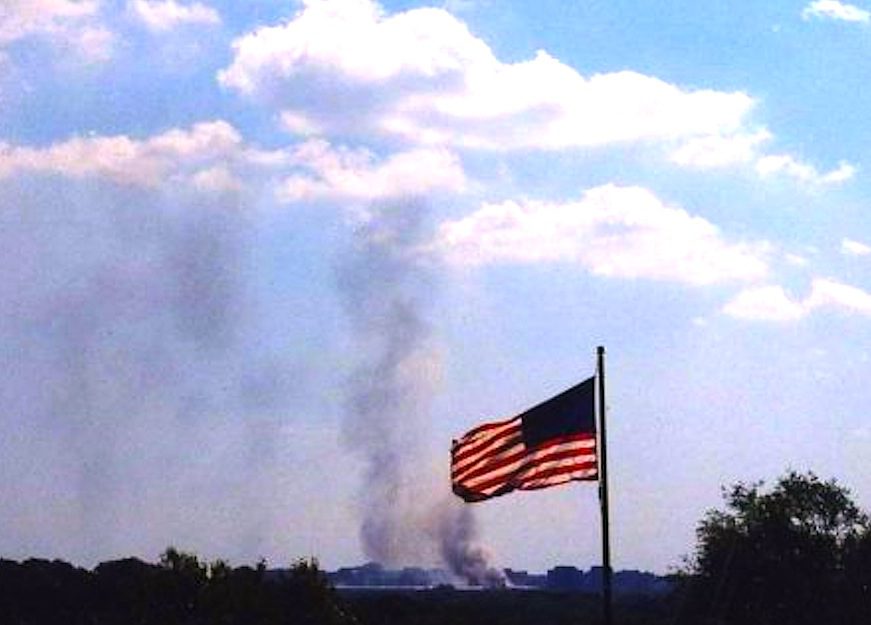9/11: The Day of the Fallen and Heroes, No One Else
By • September 10, 2019 0 752

Every year, we remember the day: September 11.
Every year, it arrives, less and less with large and loud ceremony, more and more in the closets of memory, distanced a little, and seen differently, depending on who you are, if you were alive, if you were there, or within proximity, or experienced it, like most of the world, on television and the internet, relayed or received the news from screens.
Each year, 9/11 is and becomes different, depending on where we are in time and place. Wednesday, September 11, 2019, is different from Tuesday, September 11, 2001, separated by 18 years of lives lived and lives lost, by 18 years of births and deaths, as well as three American presidential elections.
We remember the day because it was a watershed day, a hallmark day, a dangerous, horrible, tragic day, almost a radioactive day because we feel its aftereffects still. It continues to color our thinking, how we feel when we look at a clear blue sky that was the same color of that Tuesday, when we are in the most keen proximity of our memory of that day.
Two towers no longer part of the Manhattan skyline, a part of the Pentagon made deadly, leaving a black scar, four hijacked passenger planes, all of its passengers and crew members lost among the 3,000 deaths suffered in New York that day, a furrow of fire and destruction in a town named Shanksville in Pennsylvania.
More people have died from it, and continue to do so, a fact made almost unbearably vivid by the recent testimony on Capitol Hill by Luis Alvarez, a New York police detective, there to speak for the first responders who dug in the rubble of the World Trade Center and paid a price. Alvarez was pleading that the funds set aside for the care of men and women like him would be continued. He died of complications from colorectal cancer only days after his testimony. His face was gaunt, diminished and strong all at the same time at the last, surrounded by family.
Nine eleven comes back like that, and all the images and sounds do too, smoke and deadly dust, the whistles in Washington of policemen directing office workers home to the suburbs, the flicker of a late night candle in a neighborhood, big American flags fluttering across a Georgetown street, firefighters and first responders talking about the destruction at the Pentagon, health conventioneers gathered around a television set at the Mayflower Hotel, watching the second tower fell.
It would be different every year, like a memory ship heading toward the horizon, never getting there, or disappearing entirely. We captured an image of the smoke from the Pentagon that day, and some of us still leaf through a book of photographs from that day, and remember a woman talking about escaping the tower, her blonde hair streaked with dust and ash.
America was destined for war after that—al Qaeda, operating under the protection of the Taliban-led state of Afghanistan was the perpetrator, its leader Osama Bin Laden later killed in an American raid in Pakistan. We invaded Afghanistan with devastating effect, and later, we invaded Iraq, with more destructive effect.
That day, though, sometimes still seems to linger with its smoke in the nostril. We remember every year—a memorial of music in Shanksville, one of those prosaic Friday Night football town where the site of the Flight 493 crash, caused by heroic passengers battling hijackers, is a sacred place. Names will be read out, there and in New York.
Something happens and we are thrust back into the past. That day is strong and vivid again.
It happened this weekend, as just days before the Wednesday of commemoration, President Donald Trump announced that secret plans for peace talks scheduled among the Afghanistan president, Taliban officials and the president had been cancelled. The cancellation occurred apparently because the Taliban had announced an attack in which a number of people had been killed included an American soldier stationed in Afghanistan in the ongoing war which pits the Taliban against supporting U.S. troops and the Afghanistan government.
Suddenly, 9/11, almost unwillingly, had been hijacked and thrust front and center again in our politics, and in our raging, ongoing vortex of whirlwind politics. For many people—both parties it seemed—the news, if not the collapse, of the plans for talks that included the Taliban, came as a shock, especially so close to Sept. 11.
No one needed to be reminded that the 9/11 attacks were conducted against America by al Qaeda,which operated out of Afghanistan, a country controlled by the Taliban. One Republican said that no Taliban should set foot on Camp David, ever.
To many, the idea of talks—opposed by both National Security Adviser John Bolton and Vice President Mike Pence—with the Taliban was a bad idea.
The talks were supposed to include members of the Taliban who are still attacking our troops as well as the Afghanistan government. Officially, the Taliban, neither state nor government, is called the Islamic Emirate of Afghanistan. It is not clear who the members of any Taliban personnel of status were in the talks, although since 2016, one Mawlawi Hibatullah Akhundzada has been the leader of the group.
There has already been one casualty of the talks: on Sept. 10, rather unceremoniously, Trump fired Bolton.
Wednesday, however, remains a day about remembering, thinking about change, great loss and greater courage, sacrifice, shock, history.
We should think about the flight crews, the passengers, those in the buildings, think about fire and smoke, the face of Alvarez, and how all of us looked in the mirror that day.
We should listen to the names once again, sent out strongly into the air of steadfast memory.
September 11 is their day, not anyone else’s.

